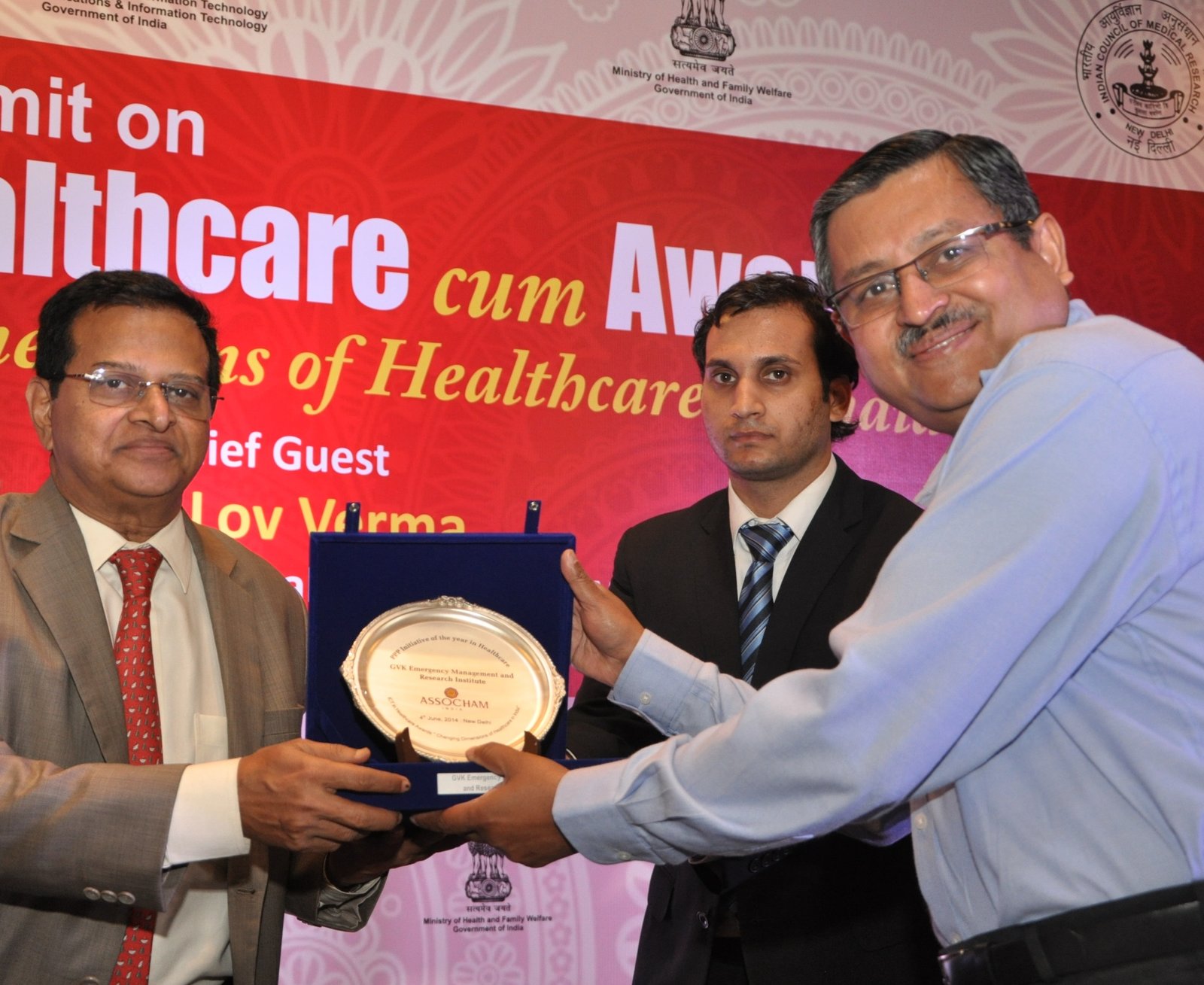GVK EMRI awarded PPP initiative of the year
June 05, 2014 | Thursday | News | By BioSpectrum Bureau
GVK EMRI awarded PPP initiative of the year
Receiving the award: (L-R) Mr K Krishnam Raju, director in-charge, GVK EMRI and Mr Lov Verma, health secretary.
GVK EMRI (Emergency Management and Research Institute), the largest professional Emergency Service Provider in India has been awarded the "Public Private Partnership (PPP) Initiative of the Year in Healthcare" at the National Summit on ICT organized by ASSOCHAM at New Delhi on May 04, 2014.
Mr K Krishnam Raju, director in-charge, GVK EMRI received this prestigious award from the chief guest, Mr Lov Verma, IAS, secretary, ministry for health and family welfare, Government of India.
GVK EMRI has pioneered the art of Information and Communication Technology (ICT) in their healthcare delivery system with committed research and investment. Supported by latest technology in distress communication and management, GVK EMRI revolutionised the concept of Emergency Care Services in India. The organisation has established an Emergency Response System that coordinates emergency through a single toll free number 1-0-8. When called in an emergency, it ensures prompt communication and activation of a response which includes assessment of the emergency, dispatch of ambulance along with a well-trained emergency medical technician to render quality pre-hospital care and transport of the patient to the appropriate health care facility. The system has also put in place the strategic principle of "right patient to the right hospital in the shortest possible time", all built on a high-end technology platform.
On the event of this esteemed recognition, Dr GVK Reddy, founder and chairman of GVK said, "We are honoured to receive this award. This indicates that our quest to develop meaningful propositions beyond just business success, is an integral part of our journey to excellence. It is an encouragement to our commitment to saving lives and bettering the healthcare services in the country."
Mr Krishnam Raju commented, "This recognition for GVK EMRI serves as further encouragement to develop services and systems that can help save lives. We are grateful to ASSOCHAM for creating a Summit that serves as a wonderful platform to learn and share experiences among all stakeholders."
With a vision to respond to 30 million emergencies and save 1 million lives annually and to deliver services at global standards, GVK EMRI is acknowledged as the most efficient, speedy, reliable and caring service provider in its category. It is the life saviour in 14 states and two Union Territories (Andhra Pradesh, Gujarat, Uttarakhand, Goa, Tamil Nadu, Karnataka, Assam, Meghalaya, Madhya Pradesh, Himachal Pradesh, Chhattisgarh, Uttar Pradesh, Rajasthan, Kerala, Diu Daman and Dadra Nagar Haveli). The service covers more than 750 million people, more than half of India's population-making it the world's largest integrated emergency service provider.
"The key approach in the health MMP will be to have an architecturally connected system in each state and thus integrating all the required components, whether they are covered in one system or many," said Mr Verma. "The broad focus areas for health MMP are public health, patient care, health administration and governance."
Talking about the role of ICT in healthcare sector, the secretary said, "With ICT adoption in health systems, we are hoping to achieve remote consultation, diagnosis and treatment through tele-medicine, facilitate collaboration and co-operation among healthcare providers."
He also said that ICT will bring a lot of transformation in healthcare service delivery as providers will have easier access to patient data and citizens will get the benefit in terms of better healthcare services.
Prevalence of paper based record keeping system, inaccessibility of healthcare information to citizens and patients, absence of effective and transparent grievance redressal system, absence of e-referral system, data duplication due to issues in data collection and reporting, shortage of doctors and other healthcare specialists, lack of timely and accurate information and analytics tools for decision making together with improper utilization of existing technology in healthcare are certain major challenges being faced in India vis-Ã -vis health and IT, further highlighted the secretary.









